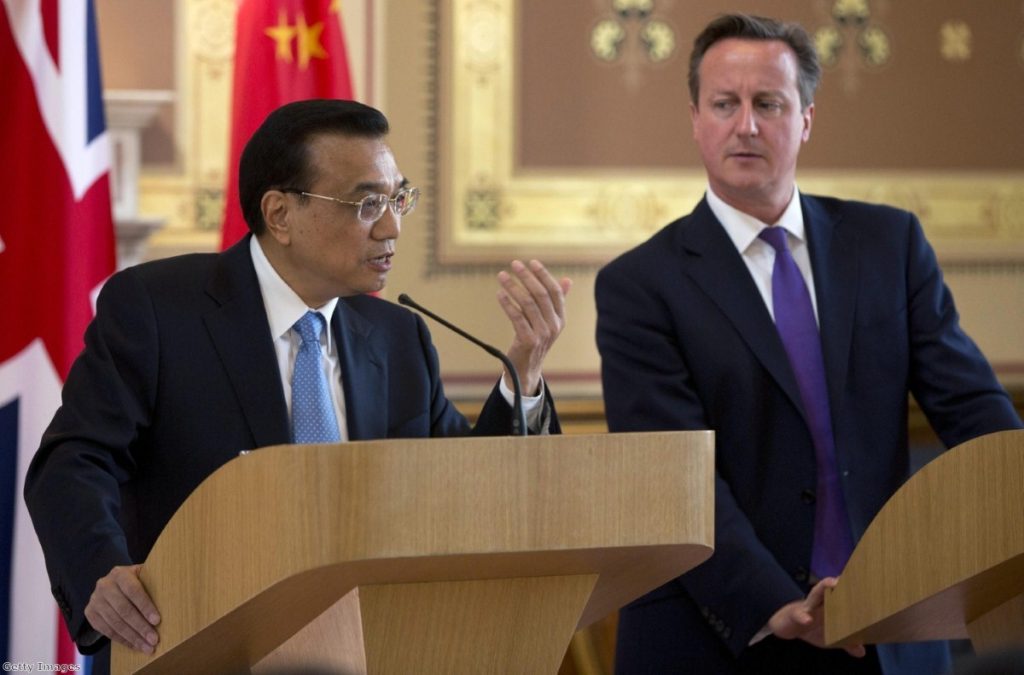China rebuffs Salmond overtures and calls for ‘united’ UK
Alex Salmond's attempts to ingratiate himself with the leadership of China over the last few years appear to have come to nothing, after the premier spoke out against independence.
Li Keqiang's comments follow those of Barack Obama, Hillary Clinton, the Pope and other world leaders, but they will be particularly irritating for Salmond given how many political sacrifices he has made to build a close relationship with the Chinese leadership.
Speaking at a joint press conference with David Cameron during an official visit to the UK, Li said he wanted a "strong, prosperous" Britain and a "united United Kingdom".
He added: "I believe that the United Kingdom can stay at the forefront in leading the world's growth and development and also continue to play an important and even bigger role for regional stability and global peace.


"We certainly respect the choice you make."
Salmond has made regular trade trips to China in a bid to show that Scotland would be able to benefit from goodeconomic relationships with other states if it becomes independent.
He faced huge criticism for refusing to meet the Dalai Lama on his visit to London in a bid not to offend the Chinese.
Cameron and Nick Clegg met the Tibetan spiritual leader, although it took years to repair the relationship with the Chinese afterwards.
Salmond's refusal to meet him saw him accused of "pandering to the diktat of the Chinese government" by Scottish Liberal Democrat leader Willie Rennie.
The Scottish first minister will struggle to find many world leaders or heads of state who would be prepared to support his push for independence.
National governments often have their own independence movements which they do not want to encourage and most anyway have a preference for stability in world affairs.
Carl Bildt, Swedish foreign minister, warned Scottish independence could lead to the "Balkanisation of the British Isles". That prompted an official complaint from the SNP, which was rejected.
A Yes Scotland spokesman said: "Unlike people in China, people here will have a free and democratic vote on September 18th when they will decide on the future of their country."
Salmond was yesterday trying to alleviate anger from the Ukrainian community after he said he admired "certain aspects" of Vladimir Putin's leadership.
The Association of Ukrainians claimed the first minister had left their community ''insulted, dismayed and upset''.
Meanwhile, former prime minister John Major attacked Salmond for inciting "anti-English sentiment" by tabling the referendum in the year of the 700th anniversary of the Battle of Bannockburn.
"We were at war centuries ago which is why, to be brutally frank, I find it rather sad that the SNP chose the anniversary of the Battle of Bannockburn for the vote, presumably to maximise the opportunity for any anti-English sentiment that may exist," he said.
A new YouGov poll released overnight gave the 'No' camp a comfortable 20-point lead, exactly in line with the average result from the pollster.
The poll also confirms Salmond's women problem, with just 31% of Scottish women planning to vote 'Yes' and 56% planning to vote 'No'.
It also suggested the abuse aimed at JK Rowling after she donated to the Better Together campaign had made 12% of voters more likely to vote 'No'..
Recent days have seen the poll gap shrink, but that may be because of a string of results from Panelbase, Survation, and ICM, which tend to put 'Yes' in a better position.









